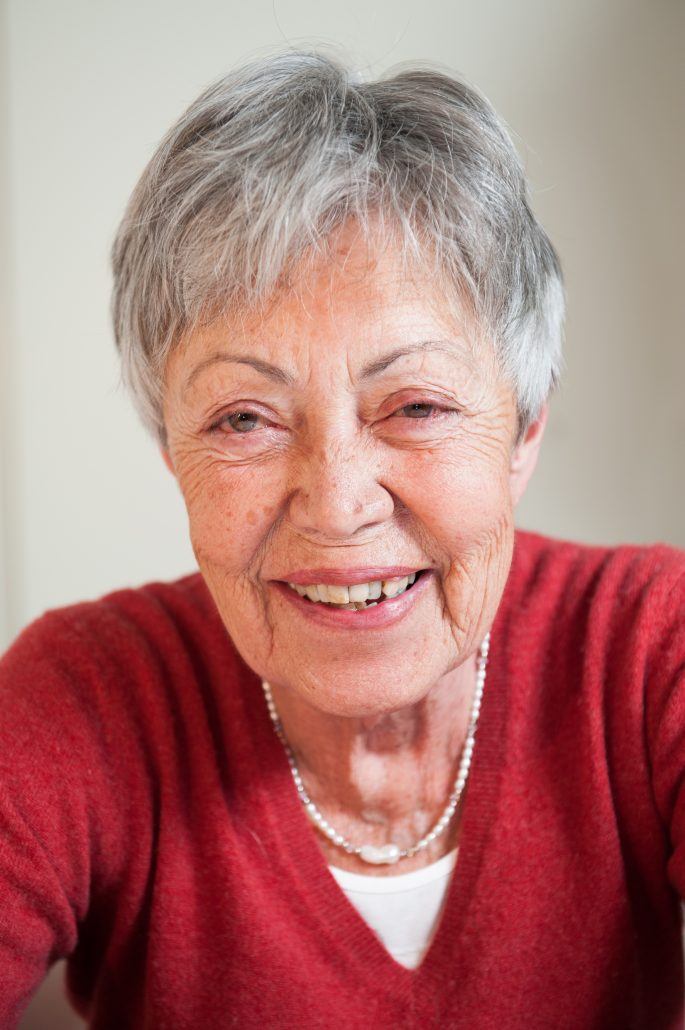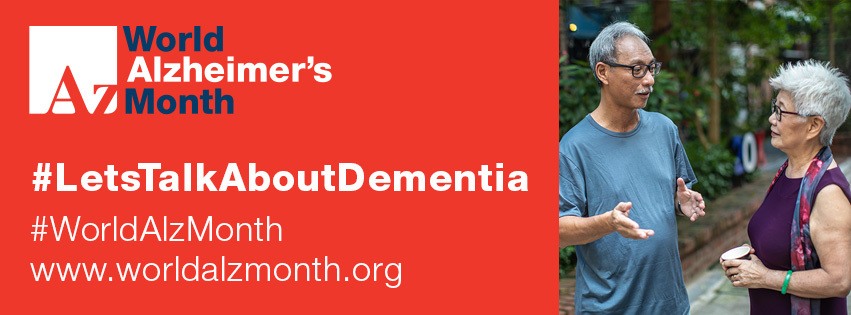On 21 september 2021 it’s World Alzheimer Day. Traditionally that day the World Alzheimer Report 2021 is launched.
Know Dementia, Know Alzheimer’s
The focus of this year’s World Alzheimer’s Month campaign is diagnosis, shining a light on the warning signs of dementia and encouraging people to seek our information, advice and support.
Previous campaigns
2020
The theme again for World Alzheimer’s Month 2020 was ‘Let’s Talk About Dementia’. It continued to highlight attention towards the importance of talking about dementia, particularly during the COVID-19 pandemic.
2019
The theme for World Alzheimer’s Month 2019 was ‘Let’s Talk About Dementia’. By highlighting the importance that dialogue plays when it comes to discussing dementia, ADI wanted to emphasise that conversations have the power to break down stigma, encourage the first step towards accessing support and services, as well as receiving a timely diagnosis.
2018
The theme for World Alzheimer’s Month 2018 was ‘Every 3 Seconds’. By focusing on the statistic that someone in the world develops dementia every three seconds, ADI wanted to highlight the huge global impact of dementia and emphasise the importance of recognising dementia as a disease and challenging the stigma that surrounds it.
2017
The theme for World Alzheimer’s Month in 2017 was again ‘Remember Me’, encouraging individuals from all around the world to learn to recognise the warning signs of dementia and to advocate for earlier diagnosis for those affected. The 2017 campaign followed on from the historic adoption of the World Health Organization (WHO) Global action plan on dementia.
2016
The theme for World Alzheimer’s Month in 2016 was ‘Remember Me’. It aimed to promote awareness and challenge the stigma of dementia by remembering those that have dementia, and advocated for national plans to tackle the disease. On World Alzheimer’s Day, his Holiness Pope Francis made a special appeal to those gathered in St. Peter’s Square to remember those living with dementia and their families.
2015
The theme for World Alzheimer’s Month in 2015 was ‘Remember Me’. It encouraged people from all around the world to learn to spot the signs of dementia, but also not to forget about loved ones who are living with dementia, or who may have passed away.
2014
The theme of World Alzheimer’s Month in 2014 was ‘Dementia: Can we reduce the risk?’. The campaign focused on ways we may be able to help reduce our chances of developing dementia, with Alzheimer associations around the world focusing campaigns on advocacy and public awareness.
2013
The theme of World Alzheimer’s Month in 2013 was ‘Dementia: A journey of caring’. It aimed to highlight the commitment of carers through the course of dementia, as well as the changing needs for people living with dementia as it progresses. Many member associations reported marked increases in new volunteers coming forward to offer their time.
2012
The theme of World Alzheimer’s Month in 2012 was ‘Dementia: Living together’. The campaign focused on reducing the stigma associated with dementia. It was the first ever global campaign for World Alzheimer’s Month, with many member associations securing strong media coverage around the month.
2011
The theme of World Alzheimer’s Month in 2011 was ‘Faces of dementia’, which promoted recognition of the signs of the disease, as well as those who commit their time and efforts to improving the lives of people with dementia and their carers on a local, regional, national and international level.
Remembering
 By far the loveliest person with alzheimer to care for of was ‘ours’, my sister and mine. Our aunt, actually our second mother. We loved her dearly. She would be delighted that her picture is on your screen now.
By far the loveliest person with alzheimer to care for of was ‘ours’, my sister and mine. Our aunt, actually our second mother. We loved her dearly. She would be delighted that her picture is on your screen now.
She passed away in 2017 and we wouldn’t pay her respect in the right way remembering her only as a person with alzheimer. She was so much more. A truly great and loving person with a beautiful rich life.
In her career in health care and her last years with Alzheimer (around 5-10 years) she would fully adhere tot the message of World Alzheimer Month:
– For people living with dementia: Although there is no cure at present, a diagnosis provides an opportunity to discuss dementia and plan for the future to maximise your quality of life.
– For carers: If you are a carer, remember to take care of yourself.
Our experience as a carer
As the campaign states, people living with dementia and their carers have an equal right to respect and inclusion, and to diagnosis, quality care and treatment.
Our experience as a carer of a beloved one with alzheimer, next to your (fulltime) job is that your mindset compares to running a marathon after a marathon. Fatigue rises and increases and you need complete focus.
It took us about a year to recover and reenergize of everything we did for our aunt during her illness. Looking after her, all her lost ‘things’, the moments of distress, her docter and hospital visits, the confusion that goes with this illness, moving house, arranging quality time for her and finding quality time together. Our family and children helped out on that.
Something energizing on World Alzheimer Day
On World Alzheimer Day we hope that carers will be able to do something really sunny, energizing, relaxing, most enjoyable for yourself. To reenergize on the short run, to be able to support your beloved one(s) on the long run.
World Alzheimer Report 2021
We look forward to the World Alzheimer Report 2021, with valuable insights and information.
Let’s talk about dementia
If you want to drop me a line (in reply to this blog or as a private message) on your experiences please do.
Let’s talk about dementia. #WorldAlzMonth Sandra Kruijt
Read more?
- Campaignsite World Alzheimer’s Month
- Toolkits in English, French and Spanish
- Alzheimer’s Disease International
For the Netherlands:
Mantelzorg – Structurele aandacht voor mantelzorg bevordert balans tussen werk en privé
Trimbos.nl | Dementie? Vergeet de mantelzorger niet
Trimbos.nl | Uitdaging: de balans vinden tussen betrokkenheid versus (over)belasting van mantelzorgers van mensen met dementie
Trimbos.nl | Ondersteuning na de diagnose dementie
Lees hier ook meer over het Namaste Familieprogramma: Het gedrag van mensen met gevorderde dementie is vaak moeilijk te begrijpen. Waaraan hebben zij behoefte? Hebben ze pijn? Het Namaste Familieprogramma en een screeningslijst voor pijn bieden concrete handvatten om de zorg te verbeteren.


Mooi geschreven! Goed om dit bespreekbaar te maken! Zeker vanuit je perspectief. Mantelzorg inpassen en waarderen was in Ierland vanzelfsprekender….